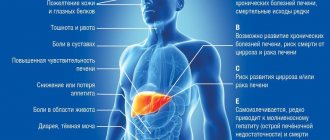How to recognize nausea
Nausea is an uncomfortable feeling associated with the need to vomit. Accompanying symptoms: pale skin, slight weakness, dizziness, rapid heartbeat, sweating. An attack of lightheadedness, the result of afferent stimulation (associated with increased tension in the parasympathetic system transmitted to the vomiting center in the core), often precedes vomiting.
Vomiting is the emptying of the stomach through uncontrolled contraction of the diaphragm. A person has a gag reflex, which causes the diaphragm to contract. For a person to vomit, the following chain must be activated: stimulus – receptor signal – nerve center of the brain. A heavy dinner (overeating), stress, and strong odors can be irritants.
Causes
The causes of illness are diseases of the human digestive and nervous system, and toxicosis of women during pregnancy. It’s not worth trying to figure out why sudden, sharp nausea occurs on your own - time is wasted and the patient’s condition is aggravated. It is important to seek medical help immediately.
Disease of the digestive system
Evening and night nausea followed by vomiting are aimed at emptying the stomach, the reason is hidden in non-compliance with the diet (attacks appear after eating), poisoning. May indicate the presence of diseases of the digestive system. If a person suffers from gastritis, has a spasm, a stomach ulcer, or feels sick after eating excessively acidic food in the late afternoon (digestion processes are reduced), during an exacerbation of the disease. In the latter case, the symptom is accompanied by stomach pain, heartburn, and disappears with exacerbation.
Liver disease causes vomiting. If a person is not bothered by pain in the organ area, but has lost appetite, feels bitterness in the mouth, or has changed skin color, the liver should be checked.
Kidney failure, kidney cancer, gallbladder diseases can manifest themselves through a feeling of lightheadedness, urine darkens, feces become discolored. If you receive a blunt injury to the lower back, blood will rush to the site of the injury, tissue compression will occur, and the person will begin to feel sick.
Central nervous system disease
Attacks of lightheadedness in the middle of the night occur due to disorders of the cardiovascular, endocrine, and nervous systems. When the pressure inside the skull is increased, compression of the brain occurs - cerebrospinal fluid presses. A person feels an attack of lightheadedness in the morning and during the day. The peculiarity of the causes is a disturbance in gait, slight weakness is felt in parts of the body, and vision deteriorates. Severe vomiting accompanies a traumatic brain injury, bruise, swelling, or concussion.
Nausea with colds and flu
If a person becomes infected with a cold or flu virus, the body becomes poisoned with toxic substances (intoxication). The patient is weakened, experiencing headaches and other symptoms, including lightheadedness. Appears due to the penetration of viruses into the central nervous system, causing failure of the heart and blood vessels, causing nausea and vomiting.
Do not try to cure an attack of lightheadedness - get rid of intoxication. Complex methods are used against viral agents. The body is full of toxins, fluid is lost through vomiting - it is important to drink plenty of fluids.
Appendicitis (inflammation of the appendix) and nausea, why do you feel sick with appendicitis?
When the appendix is inflamed, a feeling of nausea can appear at any part of the day, but is most pronounced in the evening. Additionally, the patient suffers from pain in the right lower side of the abdomen, his body temperature rises, and vomiting is possible. At the slightest suspicion of appendicitis, you should immediately go to the hospital or call an ambulance. Correct treatment for severe nausea can only be prescribed by a qualified specialist based on the results of tests and examination of the patient. Therefore, before eliminating unpleasant symptoms, you need to consult a doctor and clarify their possible sources. Most irritants that cause nausea lie in problems with the digestive system. If the problem of poor health is not isolated, but appears regularly, this is a signal to visit a gastroenterologist. Following the rules of a healthy diet and avoiding heavy foods can sometimes help to get rid of nausea due to digestive problems.
It should be noted that nausea can be overcome with the help of traditional medicine, but they cannot be used as the main method of treatment and the products of modern pharmacology should not be abandoned. Treatment with folk remedies must be coordinated with your doctor. The occurrence of a feeling of nausea, regardless of the time of day, indicates a malfunction of the body, in particular the gastrointestinal tract. This ailment cannot be left without due attention, especially if it has a certain cyclical nature and occurs at approximately the same time. Self-medication in case of diseases of the digestive system is unacceptable. To find and fix the problem, you need to consult a doctor. Attempts to self-treat appendicitis are especially dangerous, since this disease requires only surgical intervention, and delay in its use can result in death.
Pregnancy status
The early stages of a woman’s pregnancy (less often, the entire pregnancy) are complicated by a painful condition (toxicosis), accompanied by nausea. Common complaints from a girl in the first trimester are: woke up in the middle of the night - “dizzy”; I can feel very sick in the evenings and at night, it’s difficult to sleep, I often wake up from discomfort in the throat and stomach.
Causes
Scientists associate toxicosis with hormonal changes during pregnancy. The feeling of lightheadedness occurs in the morning, before bedtime, and is more acute in double or multiple pregnancies.
Causes:
- The fruit is female.
- First pregnancy.
- Hereditary predisposition (mother, sister suffered from toxicosis).
- Seasickness.
- Before pregnancy I had frequent migraines.
- Use of birth control pills.
- Frequent stress, anxiety.
- Obesity.
- Young age of the pregnant woman.
What to do
In the first trimester, women may feel mildly unwell; no treatment is required. The condition will improve if:
- Eat food often, in small portions.
- Include ginger in your diet.
- Drink often, in small portions, avoiding dehydration (two liters per day).
- Massage your wrist.
- Rest. Fatigue during pregnancy manifests itself as nausea.
- Take herbal-based medications (after medical consultation!).
This condition in the early stages should not be underestimated: against the background of toxicosis, inflammatory processes occur. See your doctor immediately if:
- The urine is dark, the pregnant woman has not urinated for more than eight hours.
- Stomach pain.
- Heat.
- Painful urination.
- Headache.
- Yellow skin.
Digestive system diseases
Nausea is one of the most common symptoms of chronic gastritis or gastroenteritis, ulcerative processes of the intestines and stomach, malsorption syndrome (malabsorption), cholelithiasis and other inflammatory diseases of the abdominal cavity.
Gastritis and gastroenteritis are an inflammatory process that is located, respectively, in the mucous membrane of the stomach and intestines. The causes of this disease may be a certain genetic predisposition, nervous strain, irregular and unbalanced meals. The reason for nausea in the evening is that a person does not follow a diet and there are long breaks between meals. The patient may also experience pain in the upper abdomen, which goes away after eating. However, more often the symptoms of gastritis and gastroenteritis are associated with eating certain foods (excessively sour, salty or spicy). Gastritis often precedes the development of much more serious diseases, such as peptic ulcers of the stomach and duodenum.
Nausea in children at night
The greatest concern for parents is childhood ailments. Nausea and vomiting at night (in the evening) are common symptoms among preschoolers. You should carefully monitor the baby's condition.
Causes
Causes of prolonged vomiting in children:
- Viral, bacterial infection. If a harmful microorganism enters the child’s stomach, the baby loses appetite, feels pain in the abdomen, and the temperature rises to 39 degrees or higher. Vomiting usually stops within 12-24 hours.
- Symptom of respiratory infection.
- Motion sickness. Children are prone to motion sickness if they sit in the back seat.
- Poisoning. A preschooler may vomit if he has swallowed a toxic substance, plant, medicine, or chemical.
What to do
Stay cool, don't panic: children sense the parent's anxiety and panic, aggravating the situation. There are a number of recommendations for action when a child is vomiting:
- Do not leave alone: while sleeping, the child may choke on vomit.
- Tilt the child, supporting the forehead with one hand and the body with the other, to ensure safe disposal of vomit.
- Let your child rinse his mouth with boiled water: the acid in the vomit can damage tooth enamel.
- Rinse your mouth with cool water periodically.
- In between attacks, give the child a small amount of water, tea, and irrigation fluids.
Possible preventative measures
Nausea in the evening and at night prevents a person from getting enough sleep. The body does not get enough rest, unpleasant symptoms intensify. Lack of sleep can cause depression. To prevent these problems, you must adhere to the following rules:
- ventilate the room before resting;
- remove all possible allergens;
- do not be exposed to nervous overload before going to bed;
- remove cosmetics and perfumes from the bedroom;
- do not eat much at night;
- do not do heavy physical overload;
- do not drink alcohol.
A warm bath with essential oils or herbal infusions will help you relax and prevent nausea. Hypertensive patients should monitor their blood pressure and be sure to measure it in the evening. A light massage, meditation, and calm music can help.
Treatment of attacks at night
If the patient's condition does not improve, seek medical help, otherwise dehydration will occur. The following are recommendations to help a person get rid of nausea, making them feel better before doctors arrive.
How to relieve an attack of nausea
Methods to help reduce the intensity and power of the disease:
- Deep breathing. Inhalation is carried out through the nose, the stomach expands when inhaling. Exhale evenly and repeat the action.
- Eating dry crackers helps absorb stomach acids. Crackers can be replaced with dry toast and white rice.
- Drink more fluids (ginger drink, peppermint tea, clove tea, water, fennel, suck on ice to stay hydrated).
Taking medications
An antiemetic drug is prescribed by a doctor after discovering the true cause of the attacks. Drugs are grouped according to their mechanism of action. An ignorant patient will do harm by choosing the wrong medicine. Antiemetic drugs include:
- Blockers. Prescribed for prevention, treatment after radiation sickness, chemotherapy; due to side effects of medications; anesthesia; gastrointestinal motility disorders.
- Centrally acting drugs. They affect the vomiting center, blocking receptors: no signal - no gag reflex.
- Dual action drugs. Aimed at enhancing gastrointestinal motility, prescribed to children.
- Local anesthetics. They are used in cases of instrumental examinations of the gastrointestinal tract to block receptors in the root of the tongue and gastric mucosa.
Nutrition
To get rid of nausea in the evening after eating, you need to establish proper nutrition: give up spicy, smoked, fried foods, as well as delicacies such as chips, fast food, and sausage. You can eat lean fish and meat, soups, corn, rice and millet porridge, potatoes.
A woman’s feeling of nausea occurs due to a lack of glucose in the blood if she is hungry. You just need to eat something and the discomfort will go away.
You should eat often, but in small portions. You should not eat foods that make you feel nauseous, even if they are healthy.
No need to drink while eating. The liquid can be consumed half an hour before meals or an hour after it.
In most cases, nausea is a symptom of some disease. To find out the reason for its appearance, you need to undergo a medical examination.











